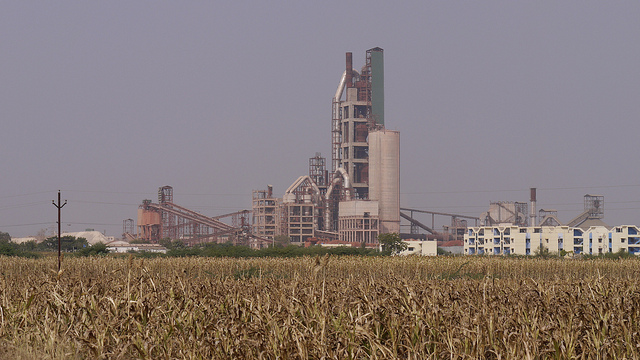Blog
GHG Protocol Product & Supply Chain Initiative Kicks-Off Stakeholder Advisory Group
Energy Savings and GHG Management Addressed
The China Business Council for Sustainable Development, in conjunction with WBCSD and WRI, hosted an informational workshop, “Corporate Energy Conservation and GHG Management,” on June 1 in Beijing at the Kempinski Hotel. Approximately 100 representatives from CBCSD’s member companies, government agencies, and NGOs attended the workshop.
India Workshop on GHG Mitigation Accounting
WRI and ABPS (India) are holding a workshop in India on tracking greenhouse gas performance of mitigation actions and mitigation goals. The workshop will take place on March 7, 2012, in Delhi. The workshop will convene experts and stakeholders from governments, civil society, and the private sector to discuss issues, practices, and solutions related to the technical challenges of quantifying GHG reductions from mitigation actions and tracking national and sub-national performance toward GHG reduction goals.
Financial Sector Guidance Technical Working Group Participation
UNEP FI and GHG Protocol invite interested stakeholders to participate in a technical working group for the development of a financial sector GHG accounting guidance and carbon asset risk guidance. Please see the Terms of Reference for details about the Technical Working Group process and a link to Survey Monkey where you can express your interest in participation.
Indian Industry Initiates GHG Inventorization Program with WRI and U.S.
Close on the heels of a new GHG program in Brazil, the Indian industry launched a national-level GHG Inventorization Program in Delhi, India, on May 28, 2008. Under the program, corporations will measure and manage their GHG emissions based on internationally recognized standards and monitor their progress towards voluntary reduction goals. The India GHG Inventory Program is a partnership between the Confederation of Indian Industry (CII), the US EPA, and the World Resources Institute.
Event Recap: Brazil Agriculture Inaugural Workshop
Agriculture and agriculture-linked land use change contribute almost 80% to Brazil’s national emissions. On September 25 in Sao Paulo, GHG Protocol held an inaugural workshop to engage key stakeholders in developing a set of new tools specific to Brazilian agriculture – a corporate GHG accounting standard and emission factors. The event featured a keynote address by Eduardo Assad, a director at Embrapa and formerly the Brazilian secretary for climate change.
GHG Protocol Releases India GHG Program Guide
The month of October saw the CD-release of the final version of the India program guide by the Indian Prime Minister’s Special Envoy on Climate Change, Mr Shyam Saran. In his remarks, Mr Saran emphasized the importance of businesses taking the initiative to deal with climate change and encouraged public-private partnerships. The guide provides guidance and examples to assist companies in accounting for, quantification and tracking of their greenhouse gas emissions using internationally accepted Greenhouse Gas Protocol Corporate Standard.
India Launch of Product Life Cycle and Corporate Value Chain Accounting and Reporting Standards
Following the launch of the Product Life Cycle and Corporate Value Chain Accounting and Reporting Standards in New York City, London, Beijing, and Tokyo, the GHG Protocol will be launching the standards in India on March 15, 2012. The event will be hosted by the World Resources Institute (WRI), World Business Council for Sustainable Development (WBCSD), and The Energy and Resources Institute (TERI). The launch event will take place in the morning and be followed by training workshops on the new standards in the afternoon.
GHG Protocol Product Program Workshop
Please join us October 25th for the first GHG Protocol Product Program Workshop. The workshop brings together product measurement, reporting, and labeling programs from around the world to: Learn how the GHG Protocol Product Standard can benefit established and developing GHG programs; Discuss ways of promoting consistency and harmonization between programs; Identify areas where the GHG Protocol can provide value and support; and Provide an opportunity for discussion and peer learning on the challenges and opportunities in program development and implementation.
First Indian Life Cycle Assessment and Management Conference
GHG Protocol holds green power accounting workshops in Washington DC and London
To garner feedback on the issues and options related to green power accounting, the GHG Protocol team held discussion-based workshops over the past few months tailored to US and European audiences specifically. The DC workshop on December 13th, 2010 centered around accounting practices relating to renewable energy credits (RECs), best practices for assuring clear emission attribute ownership, and how an emissions cap on the power sector impacts voluntary green power purchases.
Hong Kong Adopts GHG Protocol for Building Sector
Accounting for 89 percent of end-use electricity consumption, buildings are the focus of a new ‘Carbon Audit’ campaign aimed to tackle climate change in Hong Kong. On July 24, Hong Kong’s ‘Guidelines to Account for and Report on Greenhouse Gas Emissions and Removals for buildings (Commercial, Residential or Institutional Purpose) in Hong Kong’ based on the WRI-WBCSD GHG Protocol was launched in a ceremony attended by 37 major organizations, including all of Hong Kong’s major property developers, as well as media.
Greenhouse Gas Management Institute Launch Professional Certification Program
GHG Protocol Publishes Draft Licensing Policy for Public Comment
GHG Protocol has published a draft royalty-free Licensing Policy and plans to integrate this agreement into all online calculation tools and standards in the New Year. GHG Protocol website visitors will be asked to sign-in before downloading all online tools and standards and will then be asked to accept or decline the license presented before them. Users will not be asked to accept the license every time they download tools and standards; a one-time review of the license is all that is required.
Event Recap: GHG Protocol Brazil Seminar
On May 23, in São Paulo, WRI, ICLEI, C40, USP-IEE, and EMBARQ Brazil jointly brought together more than 200 Brazilian city officials and experts to discuss how to use the Global Protocol for Community-Scale Greenhouse Gas Emissions (GPC) to measure and manage greenhouse gas (GHG) emissions from cities.
Guidelines in Development Focusing on Green Power Products
GHG Management Institute Launched
WRI’s GHG Protocol Team is teaching “the new carbon math” – carbon accounting for GHG measurement and management – by developing e-learning curriculum based on GHG Protocol standards and tools. Under the GHG Management Institute, WRI will develop a series of online courses in partnership with Earth Council Geneva (ECG), the GHG Experts Network (GEN), and ClimateCheck. The institute aims to provide professional training on how to measure and manage GHG emissions. “The Institute’s philosophy is ‘if you cannot accurately measure GHG emissions, you cannot manage them’,” Michael Gillenwater, the Dean of the Institute and the Director of the GHG Experts Network, said in a press release.
First Drafts of Product and Scope 3 Standards Released
Event Recap: WBCSD Council meeting
Last week the annual WBCSD council meeting took place in Seoul, South Korea. This meeting included a constructive session for the Greenhouse Gas Management Working Group. Three strategic priorities for the coming years were agreed upon: 1) Business leading in carbon management, 2) Promoting harmonization in reporting programs, and 3) WRI partnership and collaboration. The first strategic priority will focus on engagement with investors and on CFO and investor relations, as well as on sharing GHG management best practices.
GHG Protocol's Product & Supply Chain Initiative Launches in Washington, DC and London
A new collaboration launches to develop standards for measuring and managing GHG emissions throughout the product life cycle and across the entire corporate value chain. The group is the GHG Protocol’s Product and Supply Chain Initiative, convened under the GHG Protocol. The project’s Steering Committee and technical working groups launched in September, in a series of meetings in Washington, DC and London, involving over 100 participants.



